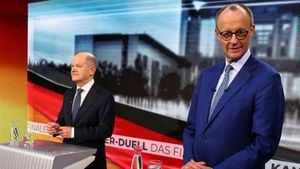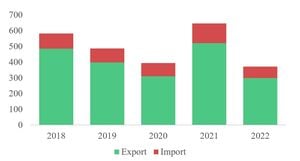The Free Democratic Party (FDP) is facing the stark reality of potentially not clearing the 5% threshold required to secure seats in the Bundestag following the 2025 elections. Election night was tense, marked by both hope and anxiety at the party's headquarters, known as the Hans-Dietrich-Genscher-Haus, where supporters watched eagerly as early results came through. Despite some early indications of optimism, such as projections hovering around the edge of the threshold, the situation quickly soured.
Christian Lindner, the party's chairman and top candidate, addressed party members amid the chaotic atmosphere, conceding, "Es ist eine Niederlage für die Freien Demokraten. Es ist keine Niederlage für den politischen Liberalismus" (It is a defeat for the Free Democrats. It is not a defeat for political liberalism). These words were echoed by the growing realization as new projections from ARD and ZDF placed the party below the requisite 5% for the first time since 2013, with numbers dipping between 4.6% and 4.7%, as reports suggested the FDP was likely to miss out on representation.
After the announcement, Lindner took to social media platform X, announcing, "Wenn das das amtliche Endergebnis ist, dann werde ich natürlich dafür sorgen, dass meine Partei sich politisch und personell neu aufstellen kann" (If this is the official final result, I will of course make sure my party undergoes political and personnel renewal). The leadership was rocked, with figures like Christopher Vogt from Schleswig-Holstein starkly declaring, "Das Ergebnis ist die befürchtete Katastrophe für unsere Partei" (The result is the feared disaster for our party).
Throughout the evening, different screens showed contrasting results, creating ripples of anticipation and despair among party members. Initially, some results showed the FDP at 5%, followed by others dropping below the threshold, leading to “Oh” exclamations and frustrated murmurs. The optimistic atmosphere began to fade, correlatively with the results themselves. Federal Transportation Minister Volker Wissing referred to the outcome as "bitter," highlighting the disillusionment with voters who previously supported the party.
The stakes could not have been higher. According to insiders, they believed the fallout from the previous government's coalition with the SPD and Greens played heavily on today's result. Many traditional FDP supporters accused the party of abandoning core economic principles. This shift was particularly damaging, as surveys indicated prior to the election, only one-third of businesses desired the FDP to maintain its position within national governance.
More concern arose from the prolific rise of the AfD, with Thüringen FDP-Chef Thomas Kemmerich expressing alarm over the troubling public sentiment making some voters lean toward the far-right party. "Wir geben nicht auf, bis die letzte Stimme ausgezählt ist" (We won’t give up until the last vote is counted), he advised, still longing for hope.
The night bore witness to the culmination of months of unease. Projections just before the election hinted at low forecasts with the FDP hovering at around 4.5%. Amid protests and calls for change, many within the party began to question if the recent course taken under Lindner had been wise. Indeed, the party appeared to shift course late, promoting its role as junior partners for either black-red or black-yellow coalitions. Nevertheless, these last-minute shifts came too late, as the coalition government had lost much of its earlier appeal to voters.
While many hoped their decision to form the previous coalition would garner support, the results cast doubt, with liberalism itself not appearing to resonate with the public. Perhaps most glaringly was Lindner's own observation of the party's standing post-election. Upon announcing his intention to step aside, he reflected on his role since late 2013, leading the FDP back to the Bundestag after years of absence following their previous electoral failure.
Political analysts emphasized how it's too early to pronounce the death of liberalism, even if the FDP has failed to achieve representation. It sparks conversations about the party's internal dynamics moving forward and whether they require revitalization. "Liberalismus ist nichts für Weicheier, er braucht eine innere Position" (Liberalism is not for wimps, it needs to stand firm), one Party General Secretary remarked, heralding the need for urgency to define the party's identity.
The FDP's performance will necessitate stringent reviewing of strategies for future elections. On the night they ostensibly have lost their Bundestag presence, the importance of addressing the needs of their traditional voter base along with re-evaluated campaign paths cannot be overstated. The once-optimistic projections had by late evening taken on grave realism, leaving party insiders and affiliates contemplating their next necessary steps and asserting whether the Brennpunkt (focal point) of liberal principles can still hold the party transversing forward.



